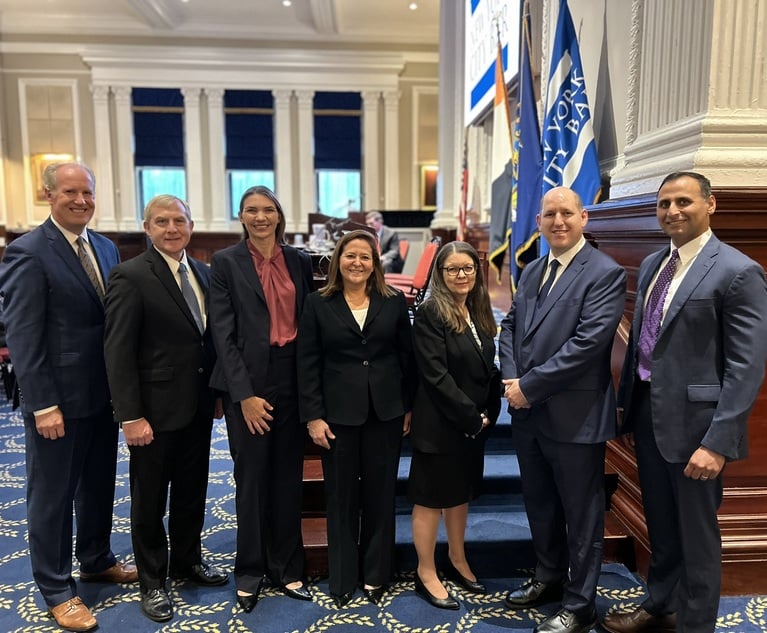Litigation Department of the Year, Finance: Simpson Thacher & Bartlett
Clients trust Simpson Thacher because of our long record of achieving courtroom victories, deftly resolving high-profile government investigations and enforcement actions, and negotiating favorable out-of-court resolutions.
October 16, 2019 at 11:08 AM
4 minute read
 From left, partners Paul Curnin, litigation department co-chair, Linton Mann III, Brooke Cucinella, Susannah Geltman and Jon Youngwood, litigation department co-chair (Photo by David Handschuh/NYLJ)
From left, partners Paul Curnin, litigation department co-chair, Linton Mann III, Brooke Cucinella, Susannah Geltman and Jon Youngwood, litigation department co-chair (Photo by David Handschuh/NYLJ)
What are some of the department's most satisfying successes of the past year and why? Our finance litigation team has achieved extraordinary results this past year through carefully-crafted legal arguments, combined with a mastery of the relevant facts. For example, we defeated class certification in mutual fund-related litigation against UBS AG, and persuaded the Kentucky Court of Appeals to dismiss a lawsuit against Prisma Capital Partners and other major investment firms in connection with the Kentucky public pension crisis. We fended off an attempt to enjoin a refinancing transaction by Hovnanian Enterprises, and achieved an outstanding outcome for Chilean conglomerate Corp Group in an ICC arbitration concerning shareholder rights in a Columbian bank. We also procured a standards-defining appellate ruling in an RMBS litigation for Countrywide Home Loans.
We strive to win early dismissals of complex securities fraud class actions and defend those rulings on appeal. For instance, the Second Circuit recently affirmed dismissal of two high-profile securities fraud suits, one against La Quinta, and the other against the underwriters of Etsy's IPO.
Where settlement is in the client's best interests, we tailor our litigation strategy accordingly. We recently resolved federal and state securities fraud class actions arising out of Alibaba's historic $25 billion IPO for a tiny fraction of the damages plaintiffs originally sought.
A prospective client in crisis calls and asks why your team should be retained. What is your answer? Clients trust Simpson Thacher because of our long record of achieving courtroom victories, deftly resolving high-profile government investigations and enforcement actions, and negotiating favorable out-of-court resolutions. We draw on our experience and expertise to design crisis management strategies that are unique to each client. Depending on the circumstances, we may pursue aggressive motion practice, engage in forthright conversations with government investigators, or invite opposing counsel to the settlement table. We consistently succeed in guiding clients out of the throes of crisis as expeditiously as possible.
What traits do you respect most in opposing firms and lawyers? While we are relentless advocates for our clients, we are exceedingly conscientious to characterize the law and the facts fairly and accurately. We also hold true to our word. We have tremendous respect for opposing counsel that do the same.
What sorts of trends are you seeing in litigation, and what do you think will be the most important development in the law/legal business that will impact your field in the next 10 years? The core analytical and strategic expertise high-caliber lawyers offer is simply impossible to replace or outsource. However, technological innovations may change aspects of the practice of law in the coming decade. We are continually looking at ways to leverage technology to improve the efficiency, effectiveness and security of legal work. We have piloted e-discovery tools to expedite document review, and implemented litigation analytics that help forecast liability and outcomes, assist in developing litigation budgets and aid in quickly identifying useful case law. We are also testing new technologies, including writing and technology tools, that may enable us to better serve our clients.
What is the firm doing to ensure that future generations of litigators are ready to take the helm? In 2018, we launched a state-of-the-art eight-day training program, STBReady, to prepare incoming associates to do more sophisticated legal work earlier in their careers. Taught by Columbia Business School faculty together with Simpson Thacher partners, STBReady offers real-world education by using actual disputes and transactions as case studies. The program includes experiential practice-specific sessions; business and financial literacy training; and sessions focused on teamwork, knowledge sharing, and other core Simpson Thacher values.
This content has been archived. It is available through our partners, LexisNexis® and Bloomberg Law.
To view this content, please continue to their sites.
Not a Lexis Subscriber?
Subscribe Now
Not a Bloomberg Law Subscriber?
Subscribe Now
NOT FOR REPRINT
© 2025 ALM Global, LLC, All Rights Reserved. Request academic re-use from www.copyright.com. All other uses, submit a request to [email protected]. For more information visit Asset & Logo Licensing.
You Might Like
View All
Elizabeth Cooper of Simpson Thacher on Building Teams in a 'Relationship Business'
4 minute read
For Paul Weiss, Progress Means 'Embracing the Uncomfortable Reality'
5 minute read
Kenneth Feinberg Had Dreams of Being on the Big Screen. His 9/11 Victims Fund Gave Him an Unexpected Star Turn

City Bar Holds 32nd Annual Henry L. Stimson Medal Presentation
Trending Stories
- 1Gunderson Dettmer Opens Atlanta Office With 3 Partners From Morris Manning
- 2Decision of the Day: Court Holds Accident with Post Driver Was 'Bizarre Occurrence,' Dismisses Action Brought Under Labor Law §240
- 3Judge Recommends Disbarment for Attorney Who Plotted to Hack Judge's Email, Phone
- 4Two Wilkinson Stekloff Associates Among Victims of DC Plane Crash
- 5Two More Victims Alleged in New Sean Combs Sex Trafficking Indictment
Who Got The Work
J. Brugh Lower of Gibbons has entered an appearance for industrial equipment supplier Devco Corporation in a pending trademark infringement lawsuit. The suit, accusing the defendant of selling knock-off Graco products, was filed Dec. 18 in New Jersey District Court by Rivkin Radler on behalf of Graco Inc. and Graco Minnesota. The case, assigned to U.S. District Judge Zahid N. Quraishi, is 3:24-cv-11294, Graco Inc. et al v. Devco Corporation.
Who Got The Work
Rebecca Maller-Stein and Kent A. Yalowitz of Arnold & Porter Kaye Scholer have entered their appearances for Hanaco Venture Capital and its executives, Lior Prosor and David Frankel, in a pending securities lawsuit. The action, filed on Dec. 24 in New York Southern District Court by Zell, Aron & Co. on behalf of Goldeneye Advisors, accuses the defendants of negligently and fraudulently managing the plaintiff's $1 million investment. The case, assigned to U.S. District Judge Vernon S. Broderick, is 1:24-cv-09918, Goldeneye Advisors, LLC v. Hanaco Venture Capital, Ltd. et al.
Who Got The Work
Attorneys from A&O Shearman has stepped in as defense counsel for Toronto-Dominion Bank and other defendants in a pending securities class action. The suit, filed Dec. 11 in New York Southern District Court by Bleichmar Fonti & Auld, accuses the defendants of concealing the bank's 'pervasive' deficiencies in regards to its compliance with the Bank Secrecy Act and the quality of its anti-money laundering controls. The case, assigned to U.S. District Judge Arun Subramanian, is 1:24-cv-09445, Gonzalez v. The Toronto-Dominion Bank et al.
Who Got The Work
Crown Castle International, a Pennsylvania company providing shared communications infrastructure, has turned to Luke D. Wolf of Gordon Rees Scully Mansukhani to fend off a pending breach-of-contract lawsuit. The court action, filed Nov. 25 in Michigan Eastern District Court by Hooper Hathaway PC on behalf of The Town Residences LLC, accuses Crown Castle of failing to transfer approximately $30,000 in utility payments from T-Mobile in breach of a roof-top lease and assignment agreement. The case, assigned to U.S. District Judge Susan K. Declercq, is 2:24-cv-13131, The Town Residences LLC v. T-Mobile US, Inc. et al.
Who Got The Work
Wilfred P. Coronato and Daniel M. Schwartz of McCarter & English have stepped in as defense counsel to Electrolux Home Products Inc. in a pending product liability lawsuit. The court action, filed Nov. 26 in New York Eastern District Court by Poulos Lopiccolo PC and Nagel Rice LLP on behalf of David Stern, alleges that the defendant's refrigerators’ drawers and shelving repeatedly break and fall apart within months after purchase. The case, assigned to U.S. District Judge Joan M. Azrack, is 2:24-cv-08204, Stern v. Electrolux Home Products, Inc.
Featured Firms
Law Offices of Gary Martin Hays & Associates, P.C.
(470) 294-1674
Law Offices of Mark E. Salomone
(857) 444-6468
Smith & Hassler
(713) 739-1250






